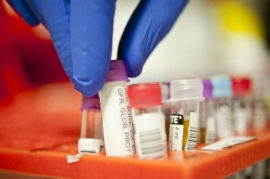Sep 15 2016
 If multiple tests are needed, the delivery of results can take longer. (Credit: University of York
If multiple tests are needed, the delivery of results can take longer. (Credit: University of York
A team of researchers from the University of York have created a new sensor that has the capacity to detect multiple enzymes and proteins in a small volume of blood, which could greatly accelerate diagnostic healthcare processes.
Tests to detect the presence of disease or infection currently require a blood sample from a patient, which is then tested in a laboratory to detect markers of disease. The presence of certain proteins can indicate a health condition and the ideal course of treatment, however only one type of protein can be detected per sample.
If a number of tests are required, like in the case of suspected presence of cancer cells or resistant infection, the delivery of results could be extended and the costs of testing rise.
The York team’s biosensor incorporates electricity and light, and can detect several disease biomarkers in a single smaller sample of blood. The technology could make blood tests a lot more comfortable for patients and enable results to be processed a lot faster.
Real Time Results
These sensors can give fast, real time results and at low cost. The length of time and money that it takes laboratory technicians to identify just one protein in a patient sample is a real challenge for the NHS and can result in emotional distress for patients. Not only can this new technology speed the process up, but it can test for a number of proteins and enzymes together in just one sample, increasing the chances of a successful and timely diagnosis.
Professor Thomas Krauss, University of York
The researchers now want to use the new sensor technology to test urine samples for urinary tract infections (UTIs), which often resist antibiotic treatment. If the biosensor can detect biomarkers of the infection and of resistance, it is highly probable that the exact course of antibiotic treatment will be prescribed in the initial consultation itself, rather than on repeat visits, which happens frequently with UTIs.
Micro-Scale
Dr Steve Johnson, from the University of York’s Department of Electronics, said: “Combining light and electricity in silicon sensors has never been done before. This exciting new technology provides in-depth analysis of biological interactions and new ways of sensing on the micro-scale.”
Ever since stratified and tailored medicines began to make an appearance, the demands on diagnostic technologies has grown, mainly with healthcare challenges linked to anti-microbial resistance.
This new diagnostic technique could have many applications and really pushes us forward in how we think about developing technologies for the future. By working together across multiple disciplines we have demonstrated a unique technology with the potential to make a real difference to health science, clinical practice, and basic science.
Jose Juan Colas, PhD Student, University of York
The research is published in the journal Nature Communications, and was supported by the UK Engineering and Physical Science Research Council (EPSRC).